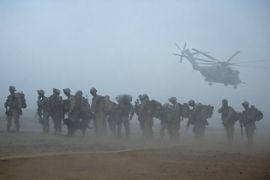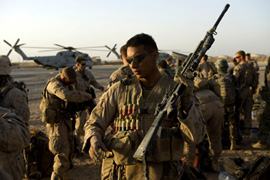US forces target Taliban stronghold
Fighters say they will counter US offensive while Pentagon says still open to talks.

Talks not ruled out
Despite the Helmand offensive, Admiral Mike Mullen, the chairman of the US joint chiefs of staff, told Al Jazeera that the US has not ruled out the possibility of talks with the Taliban.
“I think that at some point in the long-term [the Taliban] will become part of the political process. That said, I don’t think that is near at hand, from anything I have seen – not unlike other insurgencies – where that routinely happens at some point in time.
| In depth |
|
|
“At some point they will put their arms down and they will come into the process. They will look at other opportunities that they don’t have right now. The specifics of exactly how that is going to happen and when it is going to happen are yet to be determined, but overall, I think that is the path,” he said.
He warned, however, that as with “any insurgency … you have a hardcore group that you are never going to turn around, and who are going to have to be killed or captured somehow. Then you end up dealing with the vast majority of the rest of an insurgency”.
Helmand is one of the Taliban’s main heartlands in southern Afghanistan and produces the largest share of the country’s opium crop, which supplies about 90 per cent of the world’s heroin.
Jonathan Owen, a military analyst and former US marine, told Al Jazeera that the operation is significant because it marks the first time US and Afghan military forces are going to areas previously “untouched by coalition forces in any sizeable manner”.
“It’s going to be significant especially because of the impact it can have on the Taliban. This area produces about 50 per cent of the opium production worldwide,” he said.
“Any incursions the US marines make are going to directly affect that and that’s going to directly impact the funding and ability for the Taliban to carry out operations.”
Taliban counteroffensive
Al Jazeera’s Zeina Khodr, reporting from Kabul, said a similar offensive had been attempted in the same region in April last year, but US and UK troops pulled out afterwards and the Taliban moved back.
She said this time the “US forces say they will stay there and train local forces until they can take over”.
 |
| The US has sent 8,500 marines to Helmand in the last two months [AFP] |
“The Taliban say they are now launching a counteroffensive … and say they have inflicted casualties along the lines of US troops,” she said.
“US military officials have said there is some resistance and fighting.
“It is a strategic area, the Taliban get a lot of money from drug traders and can smuggle guns through the region … [but] the Taliban say this is a war and they can move to another area.
“The US military know they have lost a lot of support among Afghans because of casualties among civilians … they know this war cannot be won militarily and they are trying to show Afghans they are friends, not enemies.”
Brigadier-General Larry Nicholson, the commanding officer of the Marine Expeditionary Brigade-Afghanistan, said “what makes Operation Khanjar [Strike of the Sword] different from those that have occurred before is the massive size of the force introduced, the speed at which it will insert and the fact that where we go we will stay, and where we stay, we will hold”.
Run-up to vote
The military operation comes in the run-up to Afghanistan’s presidential elections planned for August 20.
| Helmand province |
|
|
US and Nato commanders have said they intend to seize Taliban-held territory in the south in time for the polls.
Captain Bill Pelletier, a US military spokesman, said US marines launched a helicopter assault early on Thursday in the lower Helmand river valley.
The valley of irrigated wheat and opium fields along the river is largely in the hands of Taliban fighters, who have resisted British-led Nato forces for years.
The US has sent 8,500 marines to Helmand in the last two months, the largest wave of a massive build-up of forces that will see the number of US troops in Afghanistan rise from 32,000 at the beginning of this year to 68,000 by year’s end.
The operation is a test of Obama’s strategy to train the US military’s focus on Afghanistan and Pakistan instead of Iraq, on the premise that the Taliban challenge in the former two were the main security threat facing the US.
Late on Thursday the US military announced the death of one soldier during the operation.
Separately, Britain’s defence ministry announced that one of two soldiers killed in an explosion the previous day in Helmand was the most senior British officer to have died in combat in Afghanistan.
Lieutenant-Colonel Rupert Thorneloe, 40, the commanding officer of the 1st Battalion Welsh Guards, died when a blast hit his armoured vehicle in a resupply convoy near the town of Lashkar Gah.
And against the backdrop of the Helmand offensive, the US disclosed on Thursday that an American soldier who went missing two days earlier had been seized by the Taliban.
“We are using all our resources to find him and provide for his safe return,” Captain Elizabeth Mathias said.
Our correspondent said it was the first time a US soldier has been held in captivity by an armed group in Afghanistan.

